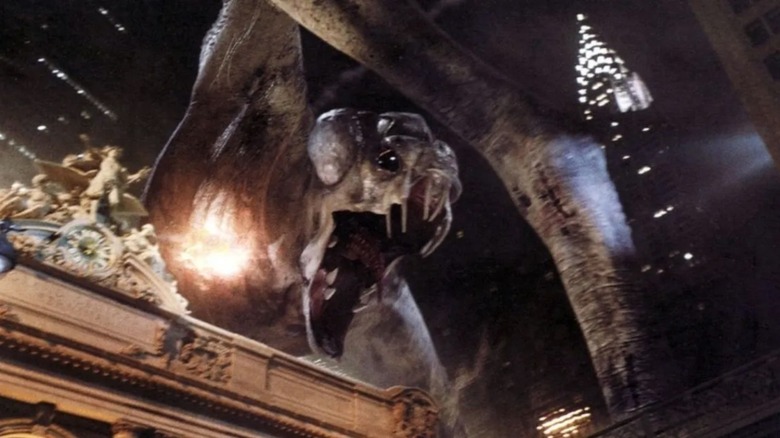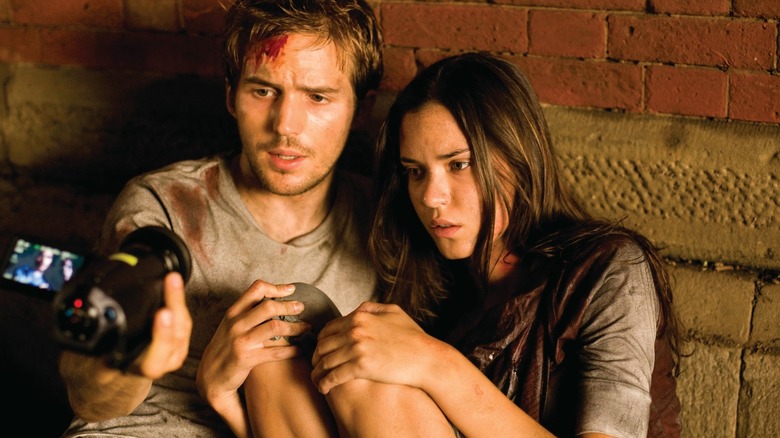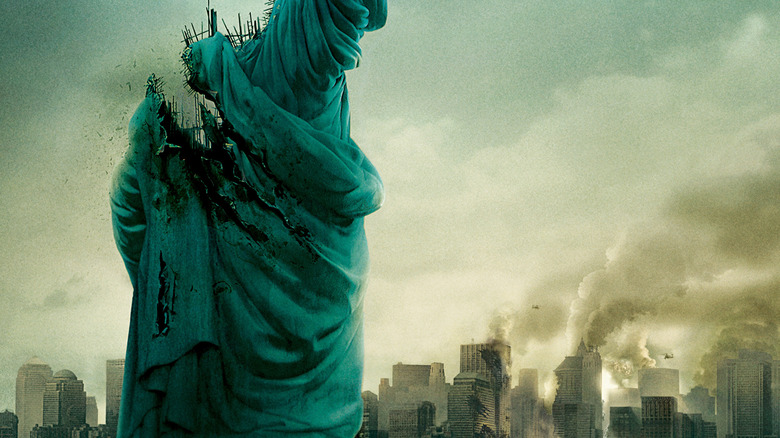Matt Reeves Says He Had 'Some Debates' About Cloverfield's Ending [Exclusive]
Remember the days when the term "mystery box" wasn't solely meant as a pejorative? Movie fans weren't always so jaded about J.J. Abrams' famous catchphrase and mission statement. Although, in fairness, it certainly helped that filmmakers at the time hadn't overused the concept to an egregious level just yet. Back in those more innocent times, mass audiences actually craved the exhilarating feeling of not having any idea what was going on — a far cry from modern fandom, where Easter eggs and references are broken down into a fine powder only moments after a movie or television show first airs.
Perhaps the most famous example of this phenomenon came as a result of "Cloverfield," the 2008 found-footage monster movie by a relatively unknown filmmaker by the name of Matt Reeves. After dropping a surprise teaser attached to prints of the first "Transformers" movie, the mysterious footage detailing some sort of apocalyptic calamity fired up the imaginations of moviegoers everywhere. The rather brilliant viral marketing campaign kept the movie's secrets incredibly close to the vest, compelling would-be viewers to show up to theaters in droves — if for no other reason than to discover what "Cloverfield" was actually about before it got spoiled.
Once audiences finally saw it for themselves, however, the shockingly downbeat ending proved somewhat divisive. After spending most of the runtime terrorizing our small circle of protagonists throughout a ruined New York City, the alien kaiju (known affectionately as Clover) ended up leaving only two main characters alive: love interests Rob Hawkins (Michael Stahl-David) and Beth McIntyre (Odette Yustman). The film concludes when the military bombs the city in a desperate attempt to destroy the monster, killing our heroes in the process and ending on an ambiguous note.
According to Reeves, that finale stoked some internal debate, too.
'We felt that the most hopeful ending was that ending'
In the years since "Cloverfield," Matt Reeves (along with writer Drew Goddard) has paid off on these relatively humble beginnings, going on to enjoy widespread acclaim by making some of the best franchise offerings in recent years on the biggest canvas possible. But at the time, success was far from a sure thing. Cue the uncertainty surrounding exactly how to bring "Cloverfield" in for a landing and whether they were truly moving forward with the best possible conclusion for the picture.
With the 15th anniversary of "Cloverfield" upon us and the movie now available on 4K SteelBook, /Film's Eric Vespe spoke to Reeves, asking if he had second thoughts in how he brought his monster movie to an end. According to the director, the rather depressing ending actually included a modicum of hope, thanks to Beth and Rob expressing their love for one another in their final moments:
"Gosh, you know, we absolutely did have some debates about it. I remember that, especially for Drew [Goddard] and I, we felt that the most hopeful ending was that ending. Because the point was, for that last moment, if that's their last moment — and there's ambiguity, but it doesn't seem good — the fact that they are with each other and they love each other, it's sort of a beautiful, transcendent idea. And then we end on them talking about that day in the footage from when they were out on that date."
The date in question refers to a trip to Coney Island that the couple once took in simpler times, though the flashback to that previous moment also includes a telltale glimpse of something falling out of the sky — heralding the arrival of the monstrous Clover.
'As tragic as it was, it also was very human'
Yet despite the tantalizing implications of the final scene of "Cloverfield," Matt Reeves kept his focus strictly on the romance of it all. He went on, however, to describe how tricky it was to find the balance between hope and the "tragic" inevitability of seeing all the characters meet their untimely (and rather gruesome) end. According to the director, he, Drew Goddard, and the rest of film's creative team went back and forth behind the scenes over whether it was "too serious" or not:
"There was something about them having at least found each other and to be together at that moment that, for as tragic as it was, it also was very human. We both loved that. So we were like, 'Oh, no, no, we have to do it this way.' So, there was talk about it, but I don't know that it ever got too serious, but there was definitely some people saying like, 'Maybe we should think about this. Does it seem too grim?' And we're like, 'Well, it feels like the right ending.' So that's kind of why we did it."
At the end of the day, filmmakers ultimately have to go with their storytelling instincts and allow their intuition to be the decisive voice in making the final call. Perhaps a more studio-friendly version of "Cloverfield" would've gone over marginally better, but it's doubtful that the movie's legacy would be the same had the storytellers compromised on their original vision. Instead, Reeves stuck to his guns and the rest, as they say, is history.


